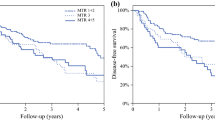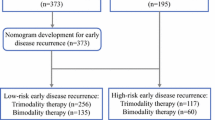Abstract
A reliable method to identify pathologic complete responders (pCR) or non-responders (NR) to neoadjuvant chemoradiation therapy (NAT) would dramatically improve therapy for esophageal cancer. The purpose of this study is to investigate if a distinct profile of prognostic molecular markers can predict pCR after neoadjuvant therapy. Expression of p53, Her-2/neu, Cox-2, Beta-catenin, E-cadherin, MMP-1, NFkB, and TGF-B was measured by immunohistochemistry in pre-treatment biopsy tissue and graded by an experienced pathologist. A pCR was defined as no evidence of malignancy on final pathology. Molecular profiles comparing responders to non-responders were analyzed using classification and regression tree analysis to investigate response to NAT and overall survival. Nineteen patients were pCRs and 34 were NRs. pCRs were more likely to be alive at follow-up than NRs (p < 0.01). Thirty-seven distinct profiles were identified. Expression of molecular markers was highly heterogeneous between patients and did not correlate with a response to NAT, survival (p = 0.47) or clinical stage (p = 0.39) when evaluated either as individual markers or in combination with other expression patterns. NAT dramatically impacts survival through a mechanism independent of known molecular markers of esophageal cancer, which are expressed in a highly heterogeneous fashion and do not predict response to NAT or survival.




Similar content being viewed by others
References
Cooper JS, Guo MD, Herskovic A, et al. Chemoradiotherapy of locally advanced esophageal cancer: Long-term follow-up of a prospective randomized trial (RTOG 85-01). radiation therapy oncology group. JAMA. 1999;281(17):1623-1627.
Perry KA, Enestvedt CK, Diggs BS, Jobe BA, Hunter JG. Perioperative outcomes of laparoscopic transhiatal inversion esophagectomy compare favorably with those of combined thoracoscopic-laparoscopic esophagectomy. Surg Endosc. 2009;23(9):2147-2154.
Holscher AH, Drebber U, Schmidt H, Bollschweiler E. Prognostic classification of histopathologic response to neoadjuvant therapy in esophageal adenocarcinoma. Ann Surg. 2014;260(5):779-84; discussion 784-5.
Meredith KL, Weber JM, Turaga KK, et al. Pathologic response after neoadjuvant therapy is the major determinant of survival in patients with esophageal cancer. Ann Surg Oncol. 2010;17(4):1159-1167.
Slotta-Huspenina J, Wolff C, Drecoll E, et al. A specific expression profile of heat-shock proteins and glucose-regulated proteins is associated with response to neoadjuvant chemotherapy in oesophageal adenocarcinomas. Br J Cancer. 2013;109(2):370-378.
Wang E, Zaman N, Mcgee S, Milanese J, Masoudi-Nejad A, O'Connor-McCourt M. Predictive genomics: A cancer hallmark network framework for predicting tumor clinical phenotypes using genome sequencing data. Semin Cancer Biol. 2015;30C:4-12.
Noble F, Hopkins J, Curtis N, et al. The role of systemic inflammatory and nutritional blood-borne markers in predicting response to neoadjuvant chemotherapy and survival in oesophagogastric cancer. Med Oncol. 2013;30(3):596-013-0596-6.
Smit JK, Faber H, Niemantsverdriet M, et al. Prediction of response to radiotherapy in the treatment of esophageal cancer using stem cell markers. Radiother Oncol. 2013;107(3):434-441.
Zhang SS, Huang QY, Yang H, et al. Correlation of p53 status with the response to chemotherapy-based treatment in esophageal cancer: A meta-analysis. Ann Surg Oncol. 2013;20(7):2419-2427.
Lagarde SM, ten Kate FJ, Richel DJ, Offerhaus GJ, van Lanschot JJ. Molecular prognostic factors in adenocarcinoma of the esophagus and gastroesophageal junction. Ann Surg Oncol. 2007;14(2):977-991.
Thompson SK, Sullivan TR, Davies R, Ruszkiewicz AR. Her-2/neu gene amplification in esophageal adenocarcinoma and its influence on survival. Ann Surg Oncol. 2011;18(7):2010-2017.
Schoppmann SF, Jesch B, Friedrich J, et al. Expression of her-2 in carcinomas of the esophagus. Am J Surg Pathol. 2010;34(12):1868-1873.
Hofmann M, Stoss O, Shi D, et al. Assessment of a HER2 scoring system for gastric cancer: Results from a validation study. Histopathology. 2008;52(7):797-805.
Binato M, Fagundes R, Gurski R, Meurer L, Edelweiss MI. Immunohistochemical overexpression of the p53 protein and ki-67 (MIB-1) antigen in patients with GERD and chronic esophagitis. Appl Immunohistochem Mol Morphol. 2010;18(3):236-243.
Hritz I, Gyorffy H, Molnar B, et al. Increased p53 expression in the malignant transformation of Barrett’s esophagus is accompanied by an upward shift of the proliferative compartment. Pathol Oncol Res. 2009;15(2):183-192.
Zhao XJ, Li H, Chen H, et al. Expression of e-cadherin and beta-catenin in human esophageal squamous cell carcinoma: Relationships with prognosis. World J Gastroenterol. 2003;9(2):225-232.
Murray GI, Duncan ME, O'Neil P, McKay JA, Melvin WT, Fothergill JE. Matrix metalloproteinase-1 is associated with poor prognosis in oesophageal cancer. J Pathol. 1998;185(3):256-261.
Abdel-Latif MM, O'Riordan J, Windle HJ, et al. NF-kappaB activation in esophageal adenocarcinoma: Relationship to Barrett’s metaplasia, survival, and response to neoadjuvant chemoradiotherapy. Ann Surg. 2004;239(4):491-500.
Zhang W, Wang L, Chang A, Jin Y, Rao J. Immunohistochemical analysis of cyclooxygenase-2 expression in premalignant and malignant esophageal glandular and squamous lesions in Cixian, China. Cancer Detect Prev. 2003;27(4):243-249.
Shamma A, Yamamoto H, Doki Y, et al. Up-regulation of cyclooxygenase-2 in squamous carcinogenesis of the esophagus. Clin Cancer Res. 2000;6(4):1229-1238.
Garcia-Aguilar J, Chen Z, Smith DD, et al. Identification of a biomarker profile associated with resistance to neoadjuvant chemoradiation therapy in rectal cancer. Ann Surg. 2011;254(3):486-92; discussion 492-3.
Acknowledgments
The authors wish to thank Cara Poage, Kelli Forquer, and Linh Matsumura for their expertise in performing the immunohistochemistry for this study.
Grant Support
Michael J Newton Esophageal Cancer Research Foundation (Bronson) and NIH T32 GM082770 (Dolan).
Author information
Authors and Affiliations
Corresponding author
Rights and permissions
About this article
Cite this article
Bronson, N.W., Diggs, B.S., Bakis, G. et al. Molecular Marker Expression Is Highly Heterogeneous in Esophageal Adenocarcinoma and Does Not Predict a Response to Neoadjuvant Therapy. J Gastrointest Surg 19, 2105–2110 (2015). https://doi.org/10.1007/s11605-015-2944-7
Received:
Accepted:
Published:
Issue Date:
DOI: https://doi.org/10.1007/s11605-015-2944-7




